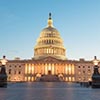 (Feb. 22, 2024) - Last week, a large group of Kansas providers joined Kansas Hospital Association staff for the National Rural Health Association’s annual Policy Institute in Washington, D.C. The group heard from many distinguished speakers, mingled with rural health advocates from around the country, caught up with members of health care organizations, and, importantly, visited Capitol Hill to advocate for positive change. Our group from Kansas met with Congressmen Jake LaTurner and Tracey Mann, who represent our state’s most rural districts and staff from our other congressional delegation offices.
(Feb. 22, 2024) - Last week, a large group of Kansas providers joined Kansas Hospital Association staff for the National Rural Health Association’s annual Policy Institute in Washington, D.C. The group heard from many distinguished speakers, mingled with rural health advocates from around the country, caught up with members of health care organizations, and, importantly, visited Capitol Hill to advocate for positive change. Our group from Kansas met with Congressmen Jake LaTurner and Tracey Mann, who represent our state’s most rural districts and staff from our other congressional delegation offices.
We discussed workforce issues, including staffing shortages and workplace safety, the importance of 340B to our state’s rural hospitals and the necessity of keeping the Medicare-dependent hospital and low-volume hospital designations in Medicare. The group also discussed the challenges of hospitals embracing the rural emergency hospital designation. We are pleased to see our delegation continues to collaborate with their colleagues on the Hill and with us on legislation regarding both the 340B program and the REH program. We look forward to positive updates in the future when these bills are ready to be made public.
Currently, Congress is on a short break until next week. Awaiting them are deadlines, with Friday, Mar. 1, and Friday, Mar. 8, being the days when the current budget extensions expire. Since the beginning of the year, neither the House nor the Senate has passed an annual fiscal year 2024 appropriations bill. Budget work is bogged down over the supplemental spending bill regarding border security and the wars in Ukraine and Israel. While some progress has been made during the past two months on the budget, including agreeing on top-line, overall numbers for FY 2024 budget, it is unclear how next week will proceed in terms of finding consensus between the Democratic-controlled White House and Senate and the Republican-controlled House of Representatives.
There are three plausible scenarios in play.
Scenario one: both sides agree to add another week or two to the current budget extension and work quickly to hammer out the details of an omnibus spending bill. This scenario would likely have majorities in both chambers on final passage, but a determined group of conservative Republicans who oppose the final package may attempt to remove the Speaker over such a move. Because of this threat, Speaker Mike Johnson (R-LA) has been reluctant to run anything without full Republican backing on the House floor.
Scenario two: both sides agree the negotiation has reached an impasse, and they decide to enact a year-long continuing resolution, funding the government at FY 2023 levels. Unless otherwise specified in the bill text, this would trigger certain spending cuts to military and non-military domestic spending. In this case, Speaker Johnson would likely be threatened with removal.
Scenario three: a government shutdown. Both sides may believe, at least initially, this will help them get what they want. It may be the path of least resistance is a combination of scenarios two and three: a short government shutdown followed by a year-long continuing resolution.